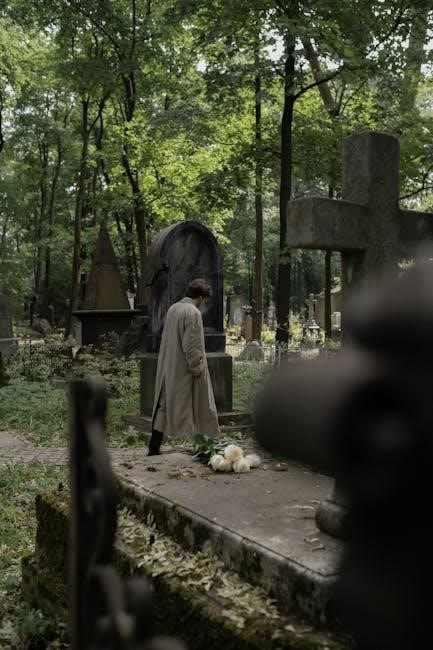Dead Men’s Path by Chinua Achebe is a poignant tale of cultural conflict‚ exploring the clash between tradition and modernity in a Nigerian village․ The story revolves around Michael Obi‚ a progressive headmaster who opposes the villagers’ use of a sacred ancestral path‚ highlighting themes of colonialism and identity․ Available as a PDF‚ this story remains a vital exploration of postcolonial Africa’s struggles․
Overview of the Story
Dead Men’s Path is a short story by Chinua Achebe‚ set in a rural Nigerian mission school in 1949․ The narrative revolves around Michael Obi‚ a young and ambitious headmaster determined to modernize the school․ His progressive ideals clash with the villagers’ traditional beliefs when he blocks an ancestral footpath used for religious and cultural practices․ The story explores themes of cultural identity‚ colonialism‚ and the consequences of imposing modernity on deeply rooted traditions‚ leading to conflict and tension․
Significance of the PDF Version
The PDF version of Dead Men’s Path offers accessible reading‚ enabling global audiences to explore Achebe’s critique of colonialism and cultural clashes․ Its digital format preserves the original text’s integrity while allowing easy sharing and study․ The story’s themes resonate in contemporary discussions on identity and modernization‚ making the PDF a valuable resource for academic and personal exploration of postcolonial literature․

Author Background
Chinua Achebe‚ born in 1930 in Ogidi‚ Nigeria‚ was a renowned novelist and poet․ His works‚ like Dead Men’s Path‚ reflect Nigeria’s cultural and historical struggles under British rule․
Biography of Chinua Achebe
Chinua Achebe was born on November 16‚ 1930‚ in Ogidi‚ Nigeria‚ to a Christian family․ He studied literature at the University of Ibadan‚ later becoming a prominent writer and educator․ Achebe’s works‚ such as Things Fall Apart‚ are celebrated for their exploration of cultural identity and colonialism․ He taught at various universities worldwide and was awarded numerous honors for his contributions to literature․ His writing continues to influence postcolonial studies and remains a cornerstone of African literary heritage․
Achebe’s Contribution to African Literature
Chinua Achebe is a cornerstone of African literature‚ challenging colonial narratives through works like Things Fall Apart and Dead Men’s Path․ His storytelling bridges tradition and modernity‚ offering profound insights into cultural identity․ By centering African voices‚ Achebe has reshaped global literary perspectives‚ inspiring generations of writers․ His work remains essential in postcolonial studies‚ highlighting the richness of African culture and the impact of colonialism‚ ensuring his legacy as a literary giant and a vital chronicler of Nigeria’s history and society․
Plot Summary
Dead Men’s Path tells the story of Michael Obi‚ a progressive headmaster who clashes with villagers over a sacred ancestral path‚ leading to conflict and tragic consequences․
Setting and Characters
The story is set in a rural Nigerian mission school in 1949‚ under British rule․ Michael Obi‚ a young‚ enthusiastic headmaster‚ aims to modernize the school‚ while his wife‚ Nancy‚ shares his vision․ The village priest represents tradition‚ emphasizing the ancestral path’s cultural significance․ The setting highlights the school compound’s beauty‚ with gardens and hedges‚ contrasting with the villagers’ belief in the sacred path connecting their shrine and burial ground․ These elements frame the clash between progress and tradition․
Conflict Between Tradition and Modernity
The core conflict arises when Michael Obi‚ representing modernity‚ blocks the ancestral footpath used by villagers for religious rituals․ The villagers‚ led by the priest‚ view the path as essential for their cultural and spiritual practices․ Obi sees it as a hindrance to progress‚ embodying his mission to erase “superstitions․” This clash symbolizes the broader tension between preserving tradition and embracing change‚ reflecting the complexities of postcolonial Nigeria under British influence‚ where Western ideals often collided with indigenous customs․
Major Themes
Cultural Clash and Colonialism‚ Identity and Tradition‚ and Consequences of Blind Modernization are central themes in “Dead Men’s Path‚” reflecting postcolonial Africa’s struggle with change and heritage․
Cultural Clash and Colonialism
The story vividly portrays the clash between traditional village beliefs and modern colonial influences․ Michael Obi‚ the headmaster‚ embodies colonial ideals‚ dismissing ancestral practices as backward․ His refusal to allow the sacred footpath reflects the broader conflict between African traditions and colonial-imposed modernity; The villagers’ deep spiritual connection to the path contrasts sharply with Obi’s rational‚ progress-oriented worldview․ This clash underscores the destabilizing impact of colonialism on indigenous cultures‚ highlighting the tension between preserving heritage and embracing change in postcolonial societies․
Identity and Tradition in Postcolonial Africa
The story delves into the struggle for identity in postcolonial Africa‚ where traditional practices meet modern influences․ The ancestral path symbolizes the villagers’ connection to their heritage‚ while Michael Obi’s reforms represent the push for progress․ This tension reflects the broader challenge of balancing cultural preservation with the demands of modernity․ Achebe highlights how colonialism disrupted traditional identities‚ forcing communities to navigate a complex landscape where their history and future collide‚ shaping their sense of self in a rapidly changing world․
Consequences of Blind Modernization
Michael Obi’s rigid pursuit of modernity leads to devastating consequences‚ as his dismissal of tradition alienates the village․ The destruction of the ancestral path sparks retaliation‚ with the village damaging the school and creating a deeper divide․ Obi’s failure to understand the cultural significance of the path results in chaos and a negative report from the Supervisor‚ highlighting the dangers of imposing change without considering the community’s heritage and values‚ ultimately undermining his progressive ideals and causing harm to both the school and the village․

Character Analysis
The story revolves around Michael Obi‚ a young‚ progressive headmaster‚ and the village priest‚ a defender of tradition‚ highlighting their contrasting views on modernity and cultural heritage․
Michael Obi: The Progressive Headmaster
Michael Obi‚ the newly appointed headmaster of Ndume Central School‚ embodies progressive ideals and modernity․ Eager to reform‚ he brings enthusiasm and innovative ideas to the traditionally backward institution․ His vision includes transforming the school compound into a place of beauty and efficiency․ Obi’s determination to eradicate what he sees as superstitious beliefs‚ such as the ancestral footpath‚ reflects his commitment to modernization․ However‚ his rigid views on progress clash with the village’s cultural traditions‚ leading to unintended consequences and tension with the community․
The Village Priest: Defender of Tradition

The village priest is a steadfast defender of tradition‚ embodying the cultural and spiritual values of his community․ He advocates for the preservation of the ancestral footpath‚ which holds deep religious and historical significance․ The priest’s dialogue with Michael Obi highlights the importance of honoring the past and respecting ancestral customs․ His wisdom and commitment to tradition serve as a counterpoint to Obi’s modernizing zeal‚ underscoring the tension between progress and cultural heritage in postcolonial Nigeria․

Symbols and Symbolism
The path symbolizes cultural heritage and tradition‚ while the school represents modernity and change․ These symbols highlight the conflict between preserving the past and embracing progress․
The Path as a Symbol of Cultural Heritage
The path in “Dead Men’s Path” symbolizes the village’s deep-rooted cultural heritage and spiritual identity․ It connects the community to their ancestors‚ serving as a route for the dead and a passage for newborns․ This sacred trail embodies tradition‚ highlighting the villagers’ belief in the interconnectedness of life‚ death‚ and lineage․ Its closure by the school represents a clash between modernity and tradition‚ underscoring the tension between progress and the preservation of cultural values․
The School as a Symbol of Modernity
The school in “Dead Men’s Path” embodies modernity‚ representing progress and change․ Headmaster Michael Obi sees it as a place to eradicate traditional beliefs and instill Western values․ The school’s structured gardens and regulations symbolize order and innovation‚ contrasting sharply with the village’s ancestral practices․ This institution serves as a tool for cultural transformation‚ reflecting the broader impact of colonial education in Africa and the tension it creates with indigenous traditions․

Historical and Cultural Context
Dead Men’s Path is set in 1949 Nigeria under British rule‚ exploring the cultural tension between traditional beliefs and colonial modernity․ The story reflects the era’s missionary influence and the clash between indigenous practices and Western education‚ highlighting the complexities of postcolonial identity and change․
Nigeria Under British Rule
Nigeria during the late colonial period‚ as depicted in Dead Men’s Path‚ was a land of contrasts‚ where traditional beliefs coexisted uneasily with British-imposed modernity․ The story‚ set in 1949‚ reflects the tension between indigenous cultural practices and the encroachment of colonial values․ Missionary education‚ like that represented by Ndume Central School‚ aimed to “civilize” Nigerians‚ often undermining their ancestral traditions․ This era shaped the country’s identity‚ as it grappled with the legacy of colonial rule and the struggle to preserve its cultural heritage in the face of foreign influence․
Impact of Missionary Education
Missionary education in Nigeria‚ as depicted in Dead Men’s Path‚ sought to replace traditional beliefs with Western values‚ often leading to cultural friction; The story highlights how missionary schools‚ like Ndume Central School‚ imposed modernity‚ dismissing ancestral practices․ This education system created a divide‚ with figures like Michael Obi embodying the push for progress‚ while the village clung to its heritage․ The resulting conflict underscores the disruptive influence of colonial education on indigenous traditions and community life․
Reception and Legacy
Dead Men’s Path has garnered significant academic attention for its exploration of cultural clash and colonialism․ Its enduring popularity in educational settings underscores its relevance in literary studies․
Critical Acclaim and Scholarly Reviews
Dead Men’s Path has received widespread critical acclaim for its profound exploration of cultural clash and colonialism․ Scholars praise Achebe’s nuanced portrayal of Michael Obi’s modernizing zeal and the village’s adherence to tradition․ The story’s ability to illuminate postcolonial tensions has made it a cornerstone of literary studies․ Its themes resonate deeply‚ offering insights into identity‚ heritage‚ and the consequences of blind modernization․ This has solidified its place in academic curricula and scholarly discourse․
Popularity in Academic Circles
Dead Men’s Path is widely studied in academic settings due to its rich thematic depth and historical relevance․ Its exploration of cultural clash‚ colonialism‚ and identity resonates strongly in postcolonial studies․ The story’s availability as a PDF has further enhanced its accessibility‚ making it a staple in literature curricula worldwide․ Its concise yet powerful narrative allows for detailed analysis‚ fostering critical thinking about tradition‚ modernity‚ and cultural heritage‚ which aligns with key academic objectives․

PDF Availability and Accessibility
The Dead Men’s Path PDF is easily downloadable and widely available online‚ making it accessible for readers and scholars worldwide․ Its popularity ensures easy access across various devices․
How to Download the PDF
To download the Dead Men’s Path PDF‚ visit a reliable source or academic website․ Search for “Dead Men’s Path Chinua Achebe PDF” in a search engine․ Select a trusted link‚ such as a university repository or e-book platform․ Follow the site’s instructions to download the file․ Some sites may require free registration or verification․ Ensure the source is legal and free from malware to safely access the story for reading or study purposes․
Legal and Free Sources
Accessing the Dead Men’s Path PDF legally and for free is possible through reputable platforms․ Many academic websites‚ educational repositories‚ and public libraries offer free downloads of this story․ Some universities provide open-access links for students and researchers․ Additionally‚ websites like Project Gutenberg or Google Books may host free versions of Chinua Achebe’s works․ Always verify the source’s legitimacy to ensure compliance with copyright laws and avoid unauthorized downloads․
Dead Men’s Path delivers a timeless message about cultural identity and modernity’s clash‚ resonating deeply in postcolonial contexts․ Its availability as a PDF ensures accessibility for global readers․
Final Thoughts on the Story’s Message
Dead Men’s Path by Chinua Achebe offers a profound reflection on the tension between tradition and modernity․ Michael Obi’s rigid opposition to the ancestral path symbolizes the broader conflict of colonialism eroding cultural heritage․ The story underscores the importance of respecting indigenous traditions while embracing progress․ Available as a PDF‚ it serves as a vital resource for understanding the postcolonial experience‚ emphasizing the need for balance between preserving cultural identity and adopting modern reforms․
Relevance in Contemporary Discussions
Dead Men’s Path remains highly relevant in contemporary discussions‚ as its themes of cultural identity‚ modernization‚ and colonialism continue to resonate․ The story’s exploration of tradition versus progress mirrors modern debates on globalization and cultural preservation․ Its availability as a PDF ensures accessibility for new generations‚ making it a valuable resource for discussions on postcolonialism and the challenges of balancing heritage with modernity in a rapidly changing world․

Study Questions
- How does Michael Obi’s modernization conflict with the villagers’ traditions in Dead Men’s Path?
- What role does the ancestral path play in the story’s cultural clash?
- How does Obi’s attitude toward the villagers reflect broader colonial dynamics?
- What message do you think Achebe conveys about cultural preservation?
Key Questions for Deep Analysis
- How does Michael Obi’s character represent the tension between modernity and tradition?
- What symbolic significance does the ancestral path hold in the story?
- How does the villagers’ reaction to Obi’s reforms reflect deeper cultural anxieties?
- In what ways does Achebe use the school as a symbol of colonial influence?
- What does the story suggest about the consequences of ignoring cultural heritage?
- How does Obi’s wife‚ Nancy‚ embody the complexities of modernization?
- What role does the village priest play in preserving tradition?
- How does the story critique the ideals of progress and development?
Discussion Points for Group Study
- Discuss the central conflict between tradition and modernity in the story․
- Analyze the symbolic significance of the ancestral path and its closure․
- Examine Michael Obi’s character as a representation of colonial influence․
- Explore the consequences of ignoring cultural heritage in the name of progress․
- How does the story portray the clash between individual ambition and communal values?
- What message do you think Achebe conveys about cultural preservation?
- How does the story relate to contemporary debates on tradition and modernity?
